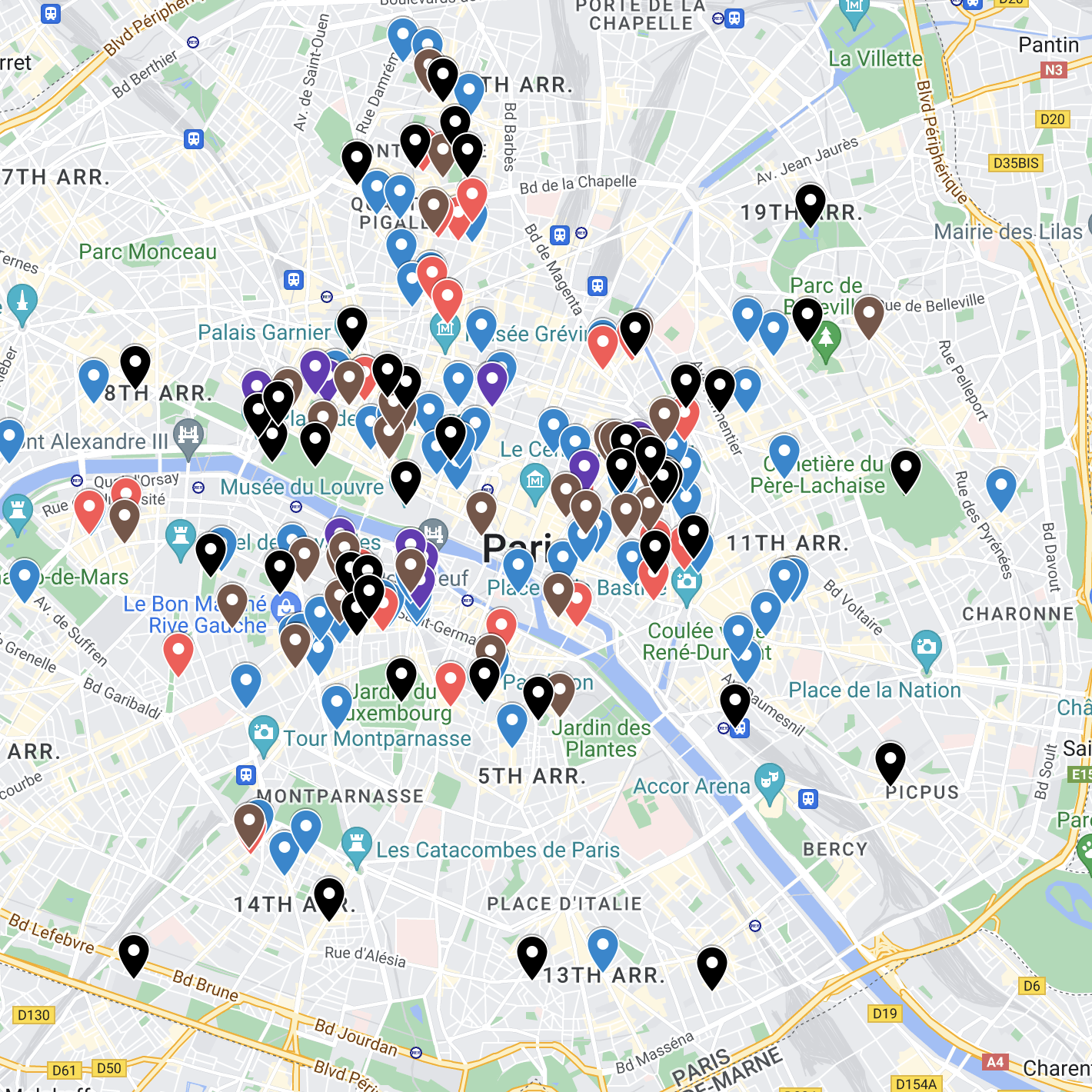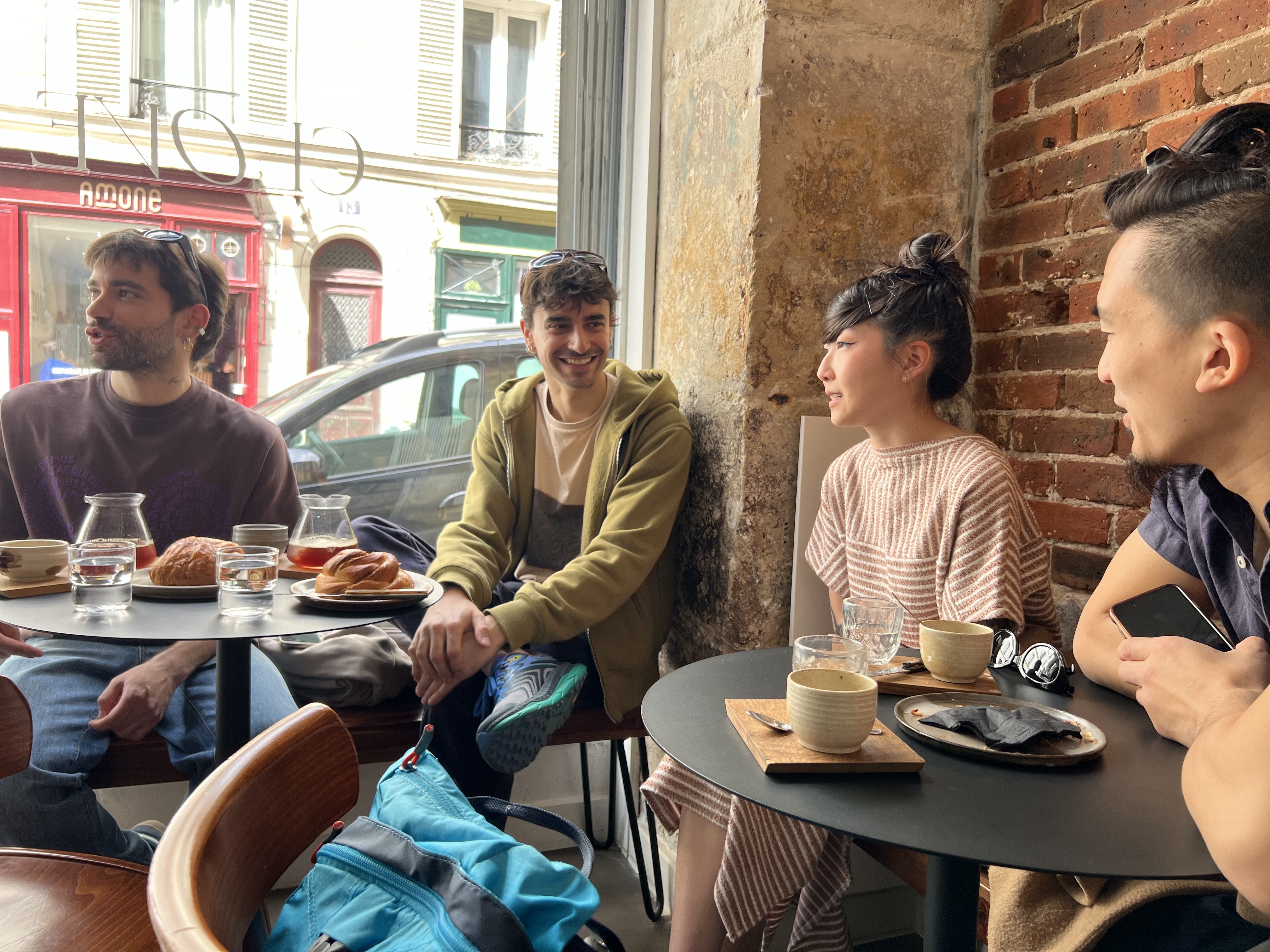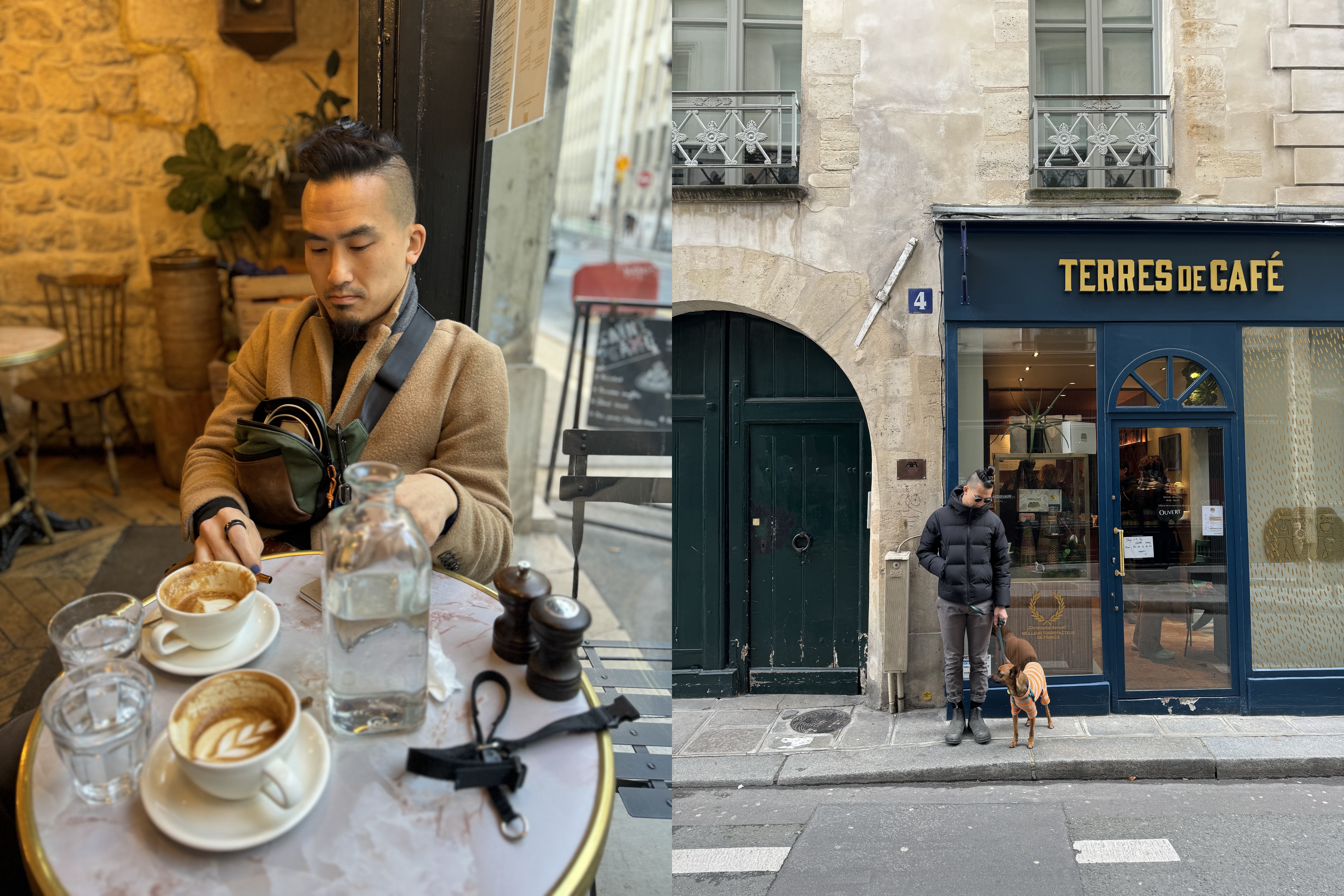the truthfulness in pretending (paris series 2, digital detoxes, pretending to be a local)
My approach to Paris was pretty scattershot. Because I was going to be there for longer than two weeks, I tried planning less. Now that I've had some time to reflect, there's two things I would've liked to have done better:
- Digitally detox 2-3 months before traveling (spontaneity trumps expectations).
- Pretend to be a local (stepping into new behaviors that are positive for both the host and the guest).
digital detoxes: spontaneity & expectations
I think the Internet has psychologically ruined travel.
Pretty much everyone compiles lists of things you have to see/do/eat/drink at and once it's discovered, it's a countdown before some influencer finds it and blows it up. It sets unrealistic expectations and pisses off establishments if they're not ready for it.
Because every meal and experience has gotta blow your mind, average expectations have been dragged up and novel spontaneity has taken a nosedive.
"What sandwich should I eat? Let's look at photos."
"What should I see at Versailles? People said the gardens are a go and the inside is a no."
"Oh, but it didn't look as good as the pictures, I dunno if I'd go back."
I shake my head and sigh because I was guilty of this.
In Paris, I found myself overly influenced by the Internet. Choices were made but not without desperate attempts to augment my experience with information - pictures, reviews, and anecdotes that would confirm the decisions I was making. There was this perverse need to validate that what I was doing and what I was experiencing was a "quality use of time". Spontaneity had no guarantee of a good time and that was the uncertainty I was trying to avoid.
Don't get me wrong, social media is a great way to use the content of others to curate a list of things to do, but the side effects to these kinds of "listicles" seem quite negative beyond bringing more business in.

A city isn't just a compilation of places to consume at. It's a complex ecosystem of people and establishments. So imagine when a bunch of tatarazzis (tourist + paparazzi, yes I made a new word) show up to a restaurant with unreasonably high expectations from Internet hype, are rude and loud, get disappointed, and then savagely flame the establishment online. Unless every restaurant is of Eleven Madison Park lineage, it's damn near impossible to please the world, so someone's going to slip through the cracks and make a rage post online.
Even the best, the ones that can handle the volume and fame, and can consistently give a good experience, end up victims of their own success because the very qualities that got them on the board end up to be something to complain about. There's the Mamma group in Paris that runs a series of highly Instagrammable Italian eateries that have taken the forefront as a "kinda sorta" tourist trap. If you read the reviews, you'll find folks complaining about the "overhyped food, long wait, better places and prices elsewhere", or that the "place was beautiful but the food was average, just go for the gram".
Was the food really bad, or was it just bad in comparison to a long wait, high prices, and loud n' annoying tatarazzis? The restaurant did purposefully set up the "vibe" in a certain way, but due to its popularity, it's now generating wait times rather than good times. Sure there's always space for improvement, but from the perspective of a restaurant owner, it's just playing whack-a-mole with Internet-cumulative customer expectations. The goal posts are in the clouds.
For me, tampering this expectation just involved not looking shit up. After week one, the desire began to dissipate when I got irritated at myself for burying my head in a small screen, thumbing my way to anxiety as I "looked shit up". The fact was I was missing out on what was going on in front of me because I was fulfilling this anxious part of me. I will admit it dissipated to some extent, but I can't say I ditched "researching" - maybe there's some optimal scrolling that gets you just excited enough, but not so excited that you create fantasy land expectations.
So what about spontaneity? You can tamper expectations by just having your own experience independent from the Internet, but that leaves the question of what I was supposed to do. You can maybe see this as some sort of weird insecurity because technically, I could do anything.
As an example, I found myself "planning" what I was going to say in French before I said it. It was very heady and very weird.
"Bonjour, j'ai une reservation pour deux personnes ce soir ... no no no, maybe start with bonjour ca va?"
"Ok, how might I order, the waitress is coming soon. Je prend? J'aimerais prendre le café? ... how would a local say that?"
I'd catch Amy's eye in the corner because these conversations were with myself. She'd say, "there goes Frank again, talking to himself, whatchu saying Fronkle, just relax, yo." There were times I wasn't even talking, and she was like "hey you're thinking, what are you thinking about, it's French isn't it, quit it." 😔 😂
Those crazy times would devolve into furiously using Google Translate to confirm how things were pronounced, what was grammatically correct, or how the local slangster would say it.
Part of it was just not having enough mastery of the French language but there was the inherent assumption that the host country would not have patience with me and would not appreciate mispronunciation and butchered French grammar. Both were untrue. They were patient, or kindly switched to English unless I specifically asked not to.
So in some way, it's not actually the Internet's fault but more of a psychological issue.
As humans, we take comfort in not delving in the unknown or knowing that something was worthwhile. It probably soothes some type of anxiety when you know where you're going (GPS), that dinner is exciting and highly reviewed (Yelp & Le Fooding), and that you will be welcome where you're going (Google Translate) .
The more accurate conclusion should be "the Internet ruins travel if you let it." Using GPS, Google Translate, Yelp, Le Fooding, Google Maps - these are choices that can be used appropriately. The Internet does help us set expectations, avoid shitty restaurants, and show effort with communication. We might not have discovered Bar Nouveau (bombass cocktails 🍸), Dumbo hamburgers (boigs 🍔 in France), and Le Compagnie du Kraft (leather bound notebooks ✏️) without the help of the Internet. I did look stuff up so I could completely order and interact in French.

So, I come back to my recommendation for digital detoxes BEFORE you go traveling, mainly to battle psychological stress in an environment you're already familiar with. This way, the minimal usage of technology won't cause the "I'm lost, I need to look up reviews, and I need to know before I go" withdrawals. You can always choose to practice patience with yourself, love and awkwardness with strangers, and live experiences as they are. You just have to put the phone down (unlike what I'm doing in the picture above 🤦♂️).
pretending to be a local
The first reason why pretending to be a local is good is to make yourself a smaller target for pickpockets and scammers. Since you look like you're a part of the place, you don't stick out like a sore thumb. I noticed I wasn't approached as often to sign flyers or dole out spare change, but rather, to give directions, which I hilariously could not help with. I tried though.
The second reason why pretending to be a local is good is basically to avoid being treated like a tourist (until I get past the introductions ... then it's obvious). I won't pretend that just because I look well dressed and can speak rudimentary French that I'll get some kind of benefit, but I'd like to think that that is the baseline effort that lands you in the "visitors" instead of the "touristy tourist" category.
In this article by the New Yorker called "The Case Against Traveling" they make the argument that traveling is bad for both the traveler and the host, and especially the host, because "tourists are less likely to borrow from their hosts than their hosts are from them, thus precipitating a chain of change in the host community." This becomes especially true when the traveler does out of character things just because they're in the mode of traveling. They might walk everywhere, sightsee, go to museums, eat out all the time, and take quintessential pictures at monuments. There becomes this kind of separation between traveling and living, when in actuality, it's still "living", just somewhere else. In this context, traveling feels like a selfish, extractive act (touristy tourist), where living feels more like a fair exchange (visitors & locals).
I recall sitting at a bar hearing an American nearby chat about wanting to hit up places that were "not tourist traps" - which I did and didn't agree with. Yeah, some places are obviously tourist traps - really middling to bad food, location situated perfectly for maximum arbitrage, no locals to be seen anywhere, prices that murder your wallet, etc. If I'm not Parisian or French, I am, to some degree, a tourist. But what I was trying to do was to connect with the people of that country and to live like a Parisian, and this meant doing some of the dull things, like ... living. It's not simply about hitting up a place (serve my needs), it's kinda about surrendering to what the French have to offer you (community, hospitality, your feet on our fucking land). Yeah, it's a little woo-woo but it is a difference in perspective. One is like a rock cannonballing into the water, the other is an ice cube floating, melting, and mixing into the water.
Some might say 'well it's because I only have two weeks, so I have to "optimize" for my time.' Okay, well, that's still not living, that's optimizing. That's cannonball, not immersion. In certain cases, that is actually okay, as long as you're not deluding yourself that you'll somehow come away radically different.
Change or not, I think it ultimately boils down to being holistically curious about the place you're in, along with having a respect for the people you're interacting with. I did it by dressing well (Parisians usually looked real nice), having basic mannerisms (bonjour, merci, s'il vous plaît), and speaking as much of the language as I could before they figured out I didn't know shit. I also went to my local boulangerie, shopped at standard grocery stores (peeked to see what French grandmas had in their carts), checked out frozen food shops, signed up for gym memberships, rolled with the local jiujiteiros, and did a fuck-ton of baguetting, walking, and reading in some beautiful gardens. We also sort of cheated because we had a dog, and usually people don't think you have a dog unless you're here for the long haul. That led to some interesting conversations.

I get where that article was coming from though. How many people actually change when they return to their own country? Part of the essence of what the New Yorker was talking about was the inherent selfishness of traveling. "Oh look at me, look at what I've done, etc". I'm guilty of this too. I have social media, I take pictures, I share shit, like fuck, what's this thing I'm writing right now, right? I won't pretend that I'm morally any higher than other travelers.
Of the work that I did to actually prepare for this trip though, the most important piece was promising myself to write down what habits, values, and behaviors I liked in Paris in order to try and integrate them into my life back here in the Bay Area. Here are some:
- continuing learning the French language - I talk so much about connection, language is the first way to do that
- good bread and good wine - I used to not eat so much bread due to gluten fears, but I am now a baguette / sourdough convert. I'm coming around to wine. Fortified wine though, I'd happily down some of that
- the French pace of life - 2-3 hour dinners, lounging, walks, writing, literature, life not centered around work
- being well dressed - when you dress well, you feel good, when you feel good, you feel confident, and when you're confident, it's awesome
- walking and cycling more than driving - this might be a tough one in the car dominant culture of the States
- appreciation for beauty - Paris is extrinsically very beautiful, which is an amazing training ground to fine tune appreciation for the intrinsically beautiful (maybe more on this later)
Obviously, that's not all what French culture was about. It's infinitely deep, especially once you live there for longer than two months and can converse in French. For me, the experience was vividly enhanced when I tried to connect with the essence of Paris without relying so much on the Internet. Coupled with pretending to be a local, I think it's a strong start to getting a lot more out of traveling. 🤗
